What Gauge Wire for Garage Door Opener? (Basics, Selection, Tips)

Choosing the right gauge wire for a garage door opener is crucial for safe and efficient operation. When setting one up, you might ask: What gauge wire should I use?
In General, the 18-gauge wire is standard for most residential setups; factors like distance from the power source and door type may demand thicker wires.
This guide explores the significance of wire gauges, understanding wire types, and tips for proper installation to ensure optimal performance and safety.
We’ll go into more detail below.
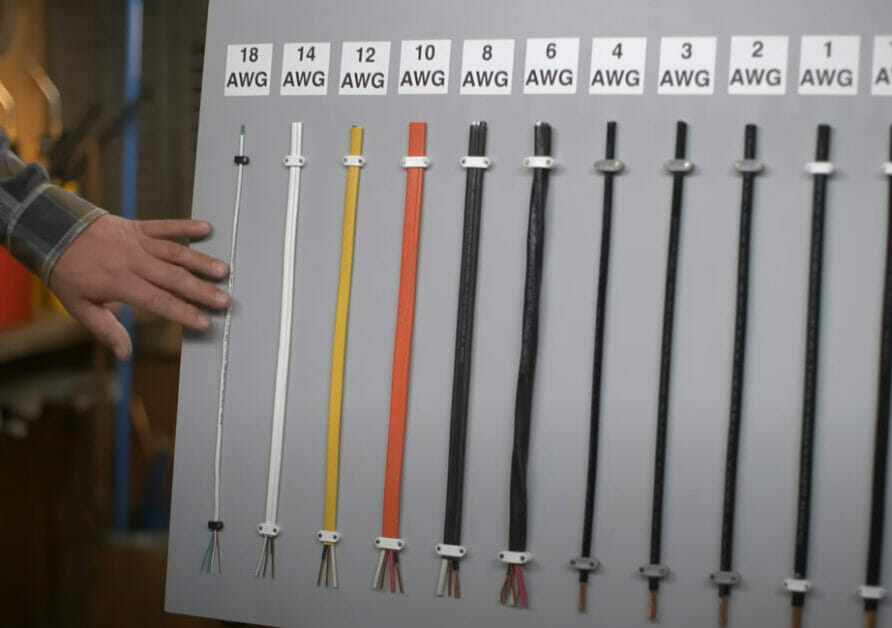
The Basics of Wire Gauge
Before we dive into the specifics, let’s get our facts straight. We’re talking about wire gauges here, a crucial aspect to consider when installing your garage door opener.
So, what exactly is a wire gauge? It’s simply a standard measure for the diameter of an electric or telecommunication wire.
The wire’s thickness dictates the amount of electrical current it can carry without risk of overheating or fire. So, choosing the right wire gauge ensures both smooth operation and safety.
Quick breakdown:
| Wire Gauge | Description |
| 16 gauge wire | Recommended if you have an industrial-scale operation with heavy doors or long-distance wiring needs. |
| 18 gauge wire | Typically used in most residential garage door openers. It offers sufficient power and strength for standard single or double-car garages. |
Remember, folks, thicker wires (with smaller gauge numbers) can carry more electric current than thinner ones (with larger gauge numbers). Confusing? Yeah, I know!
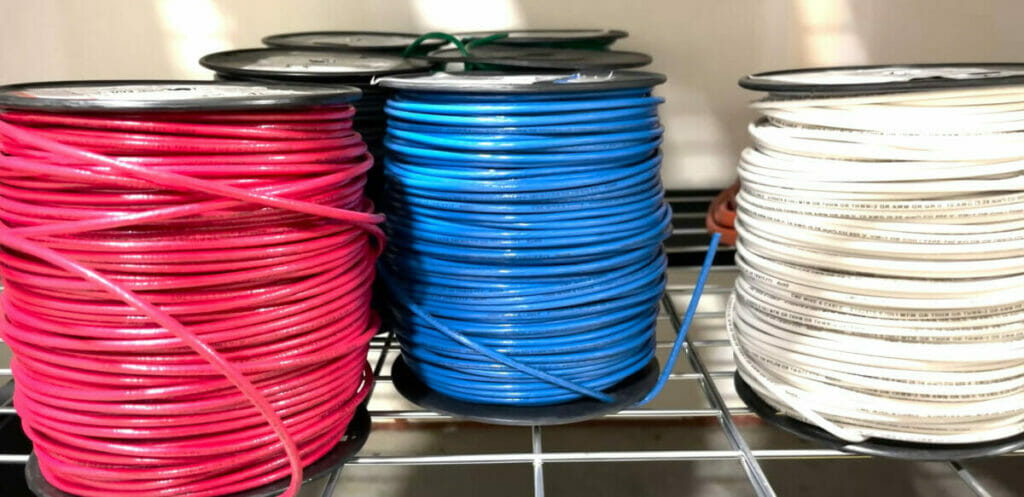
Wire Types and Optimal Gauges for Garage Door Openers
When selecting a wire for your garage door opener, it’s not just the gauge that matters. The type of wire you choose can impact both functionality and longevity. Here’s a quick rundown:
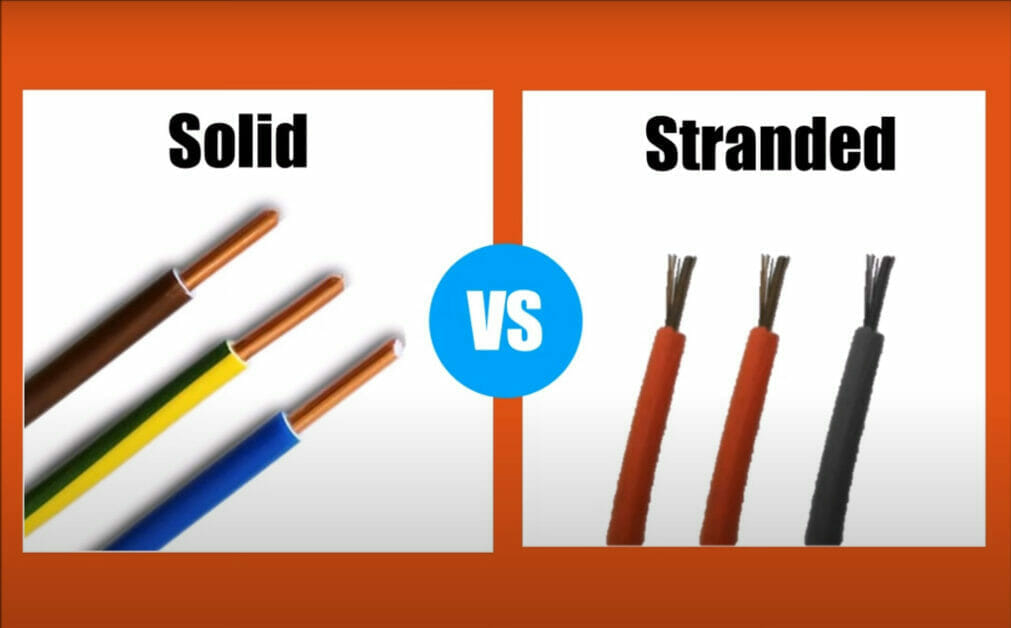
Wire Types:
| Wire Type | Composition | Characteristics |
|---|---|---|
| Solid Wires | Single Solid Strand | – More durable – Suitable for permanent installation where movement is minimal – Can handle a single bend or route |
| Stranded Wires | Multiple strands twisted together | – More flexible – Suited for parts that move frequently, such as certain parts of the garage door system |
Recommended Wire Gauge:
Most manufacturers recommend using an 18-gauge wire for garage door openers. This particular gauge offers a solid balance between durability and flexibility.
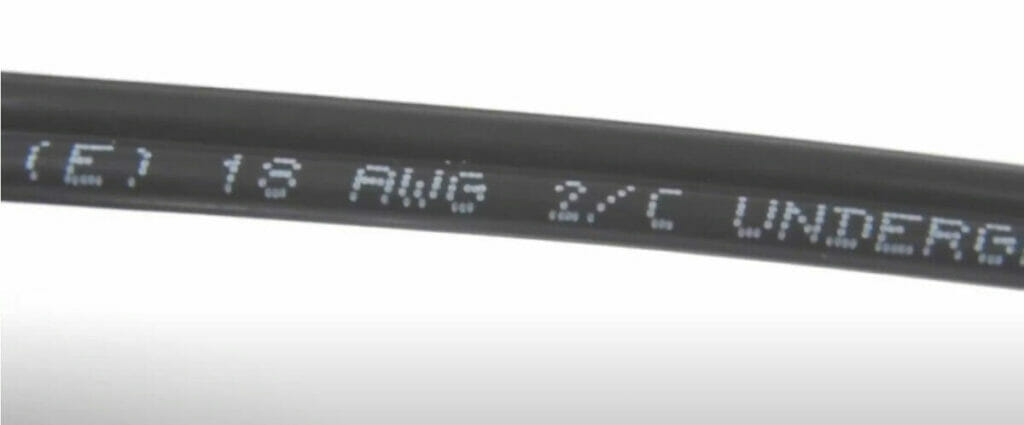
Quick Breakdown:
- 16-Gauge Wire: Recommended for industrial-scale operations with heavy doors or long-distance wiring needs.
- 18-Gauge Wire: Ideal for most residential garage doors up to 3/4 horsepower (HP)
- 20-Gauge Wire: Suitable for lighter use or smaller motors
- 22-Gauge Wire: Not recommended due to its thinness and lack of strength
Note: Anything thicker than 16 gauge might be overkill for a standard residential garage door opener.
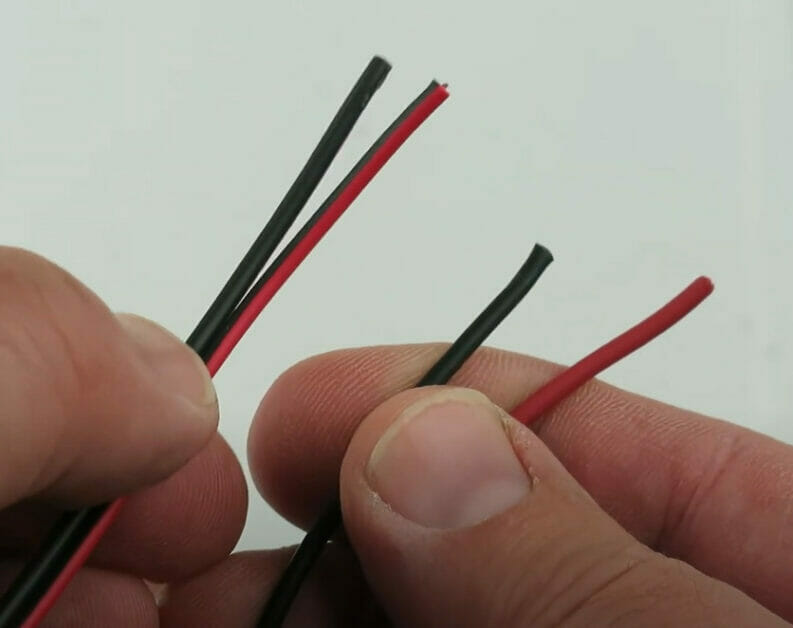
The High Cost of the Wrong Wire Choice
I’ve been knee-deep in home renovation projects for a good chunk of my life, and I’ll tell you, one crucial thing is getting your garage door opener wired correctly. There’s a real risk if you choose the incorrect wire gauge.
Here’s an in-depth look at why making the right wire gauge decision is paramount:
- Safety Hazards: Undersized wires can’t handle the electrical load, causing them to overheat.
- Voltage Drop: If your wires aren’t thick enough (if they have too high a gauge), they can lead to insufficient power reaching your garage door opener.
- Operational Issues: Inaccurate wire gauges may cause frequent tripping of circuit breakers or blowing fuses due to overload conditions.
- Shortened Lifespan: Using an unsuitable wire gauge may reduce the lifespan of your precious garage door opener by forcing it into overdrive mode most of the time.
Maintenance and Inspection
Ensuring any equipment or system’s longevity, safety, and optimal performance is rooted in regular upkeep and vigilant examination.
Dive into the intricacies of maintenance and inspection to understand their pivotal role in preventing unforeseen disruptions and ensuring smooth operations.
- Routine Checks: Inspecting the wire insulation of your garage door opener regularly is essential. This helps in identifying any early signs of wear or potential damage. Addressing these issues promptly can prevent minor problems from escalating into major ones.
- Clean Environment: Over time, dust, dirt, and other particles can find their way into the system’s components, potentially hampering its operation. It’s important to regularly clean the surrounding area, ensuring that the garage door opener and its electrical pathways remain unobstructed. This not only aids in smooth functionality but can also prolong the lifespan of the components.
- Secure Loose Wires: Just as with any machine or system, parts can become loose over time due to the regular wear and tear of operations. Regularly checking to ensure all wire connections are snug and secure can prevent sudden malfunctions and ensure steady electrical flow.
- Professional Inspection: While regular DIY checks and maintenance are beneficial, there’s no substitute for the keen eye of a professional. Hiring an expert to inspect the garage door opener system annually can provide an in-depth assessment, identify latent issues, and offer peace of mind that everything is in top shape.
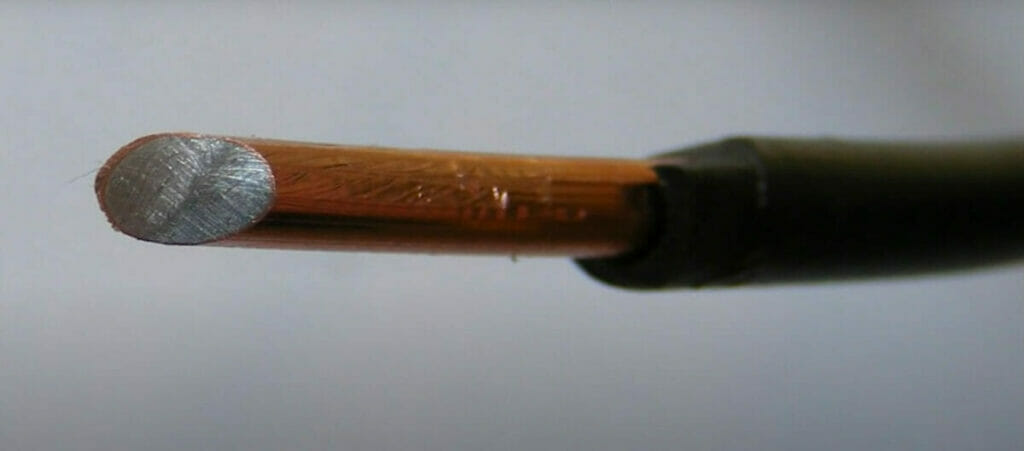
Other Considerations in Wire Selection
When selecting the right wire for your garage door opener, there’s more to consider than just the gauge.
Dive into the detailed breakdown in the table below to make an informed decision.
| Factor | Consideration |
| Insulation Type | Can affect how well the wire stands up to temperature changes |
| Wire Length | Longer wires require thicker gauges due to increased resistance |
| Material | It can affect how well the wire stands up to temperature changes |
| Local Building Codes | Depending on where you live, there may be specific regulations about what kind of wire you can use in your garage. |
| Future Upgrades | Copper wires are usually more conducive and durable than aluminum |
Cost Implications
Choosing the right wiring for your garage door opener is crucial for optimal functioning and longevity. However, this decision comes with varying costs influenced by several factors.
We provided a cost implication table to help you make an informed budgeting decision. This table offers a comprehensive breakdown of potential expenses, aiding in understanding where your money is best invested.
| Factor | Potential Cost Increase Factors | Potential Cost Savings Factors |
|---|---|---|
| Type of Wire | Stranded wires may cost more due to flexibility. | Choosing a more affordable but suitable wire type. |
| Length Needed | Longer wire runs increase the total cost of wire. | Measuring accurately and buying only what’s needed. |
| Professional Installation vs. DIY | Professional services charge for labor and expertise. | DIY can save on labor costs if knowledgeable. |
| Potential Savings from Proper Selection | Incorrect gauge/type may lead to higher energy costs. | Correct wire choice ensures efficient power use. |
| Maintenance and Repair Costs | Neglected systems may require frequent, costly repairs. | Regular maintenance can reduce significant repair costs. |
From the type of wire to professional installation fees, here’s a detailed breakdown of the estimated expenses you might incur for your garage door opener wiring.
| Item/Service | Description | Estimated Cost ($) |
|---|---|---|
| Wire Material | ||
| Solid Wire (per foot) | Typical cost per foot for solid wire. | $0.50 |
| Stranded Wire (per foot) | Professional Installation (flat-rate) | $0.70 |
| Length of Wire Needed | ||
| Total Wire Length (50 feet) | Average length for a two-car garage. | $25-$35 |
| Installation | ||
| Cost of regular maintenance service calls. | Cost to have a professional install the wiring. | $150-$250 |
| DIY (tools, accessories) | Cost of tools and any other accessories for DIY installation. | $30-$50 |
| Maintenance and Repairs | ||
| Annual Maintenance (service call) | The sum of all costs for the project. | $60-$100 |
| Repair Costs | Any potential costs for repairs in the future. | $50-$150 (variable) |
| Additional Factors | ||
| Local Building Permit (if required) | Cost to get a permit for electrical work in certain jurisdictions. | $50-$150 |
| Energy Cost Savings (annual estimate) | Potential annual savings from efficient wiring. | -$10 to -$30 |
| Total Estimated Cost | Sum of all costs for the project. | $355-$735 |
Note: Prices can vary based on brand, quality, and region. It’s always good to research prices in your local area or online retailers before purchasing.
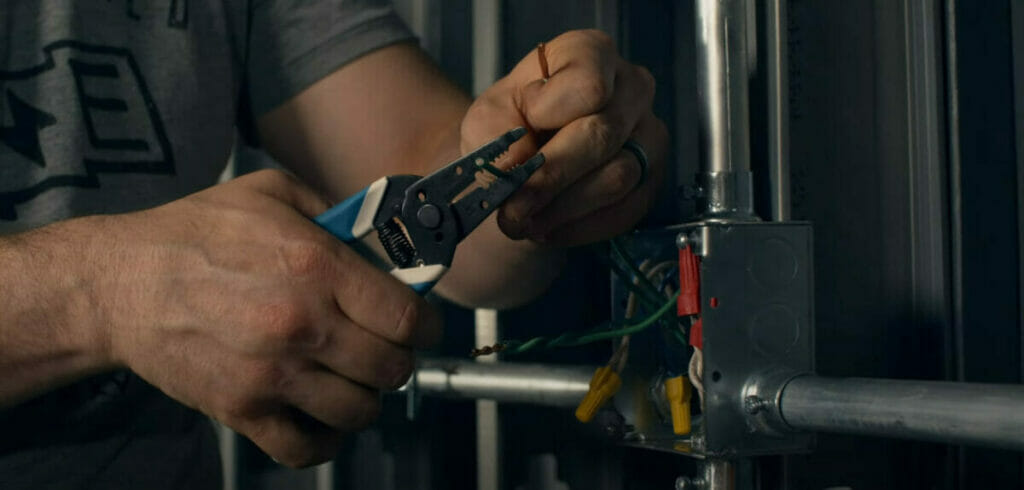
Installation Tips
Let’s dive into some handy tips for installing your garage door opener. Whether you’re a DIY enthusiast or a professional, these pointers will guide you to ensure a smooth and safe installation.
- Choose the Right Wire Gauge: Most garage door openers use 18-gauge wire, but depending on the specific model and the distance between the opener and switch, you might need heavier 16-gauge wire.
- Mind the Wire Stripping: Always strip only about half an inch of insulation from the ends when handling wires. This precaution prevents possible short circuits if exposed wires touch each other.
- Secure Wire Routing: Proper wire routing is essential. Never allow wires to dangle freely. Instead, secure them along the ceiling or wall using insulated staples or cable clips. This ensures a tidy installation while reducing the risk of accidental damage.
- Avoid Metal Interference: One of the lesser-known concerns in installation is interference from large metal objects. Avoid running wires near such objects, as they can disrupt the signal transmission from your remote control, leading to operational issues.
Frequently Asked Questions
Q: Can I reuse old wires when replacing my garage door opener?
A: While it might be tempting to reuse existing wires, replacing them during a new installation is generally recommended. Over time, wires can become damaged or degraded, potentially impacting the safety and functionality of your system.
Q: How often should I inspect my garage door opener’s wiring?
A: A visual inspection of the wires for any visible damage or wear should be done at least once every 6 months. For a comprehensive check, consider a professional inspection annually.
Q: Can I mix different wire gauges in my garage door opener installation?
A: Mixing wire gauges isn’t advisable. Using different gauges could lead to operational inefficiencies and safety concerns. It’s best to stick with a consistent wire gauge throughout the installation.
Q: How can I determine the wire gauge of my existing installation?
A: Many wires have the gauge printed or embossed along their insulation. If not, wire gauge measurement tools are available at hardware stores, or you could consult with a professional electrician.
Q: What are the signs of an incorrect or faulty wire installation for my garage door opener?
A: Symptoms might include the opener not working consistently, the remote control having a reduced range, buzzing sounds, or visible wear and damage to the wires.
Q: Is there any advantage to overcompensating with a thicker wire gauge?
A: While thicker wires can handle more current, they might be overkill for standard garage door openers and harder to work with due to reduced flexibility. It’s best to choose the gauge that matches the requirements of your specific opener model and installation scenario.
Q: Can I install a garage door opener wire on my own?
A: If you have a basic understanding of electrical work and feel confident, you can attempt a DIY installation. However, a professional installation for safety and optimal performance might be worth considering, especially if unsure.
Q: What safety precautions should I take when working with garage door opener wiring?
A: Always turn off the main power source before starting any work. Use insulated tools, avoid splicing wires unless necessary, and ensure your workspace is dry to avoid electrical hazards.
References
Website Resources:
- National Electrical Contractors Association (NECA). https://www.necanet.org/
- International Door Association. https://doors.org/
- The Family Handyman. https://www.familyhandyman.com/
- Wire and Cable Your Way. https://www.wireandcableyourway.com/
Video Resources:
Electrician U
Electronic Goldmine
Discount Low Voltage
Empowered Electric
Electrical Engineering XYZ
This Old House
